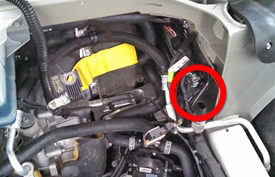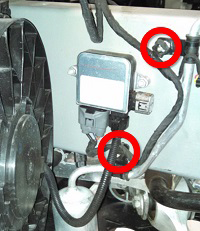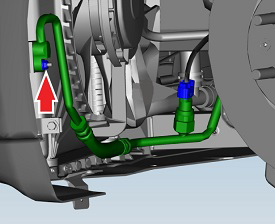Tesla Model S: Pipe - High Pressure - Compressor to Condenser (Dual Motor) (Remove and Replace)
Tesla Model S (2012-2026) Service Manual / Thermal Management / Pipe - High Pressure - Compressor to Condenser (Dual Motor) (Remove and
Replace)
Removal
- Position the vehicle on a lift, but do not raise it at this time.
- Recover refrigerant from the vehicle (refer to procedure).
- Remove the 12V battery (refer to procedure).
- Remove the bolt that secures the high pressure pipe to the compressor (torque 10 Nm). Caution: Plug pipe connections to prevent ingress of moisture or dirt. Caution: Remove and discard O-rings.
- Disconnect the pressure/temperature sensor connector.

- Release the clip that secures the high pressure pipe to the coolant hose.
- Remove the front LH lower wheel arch liner (refer to procedure).
- Fold the front LH upper wheel arch liner back, towards the rear of the vehicle for access.
- Remove the nuts (x2) that secure the high pressure pipe to the
frame rail (torque 6 Nm).

- Remove the nut that secures the high pressure pipe to the
condenser (torque 8 Nm).
Caution: Plug pipe connections to prevent ingress of moisture or dirt.
Note: Components have been removed in this graphic to aid clarity.

- Remove the hose from the front LH wheel well.
Installation procedure is the reverse of removal, except for the following:
Caution: Lubricate new O-rings with clean refrigerant oil.
READ NEXT:
 Pipe - Low Pressure - Charge Port (Remove and Replace)
Pipe - Low Pressure - Charge Port (Remove and Replace)
Removal
Recover refrigerant from the vehicle (refer to procedure).
Remove the underhood storage unit (refer to procedure).
Disconnect the low pressure temperature transducer connector
 Pipe - High Pressure - Charge Port (Dual Motor) (Remove and Replace)
Pipe - High Pressure - Charge Port (Dual Motor) (Remove and Replace)
Warning: If the 12V power supply is disconnected, do
not attempt to open any doors with door glass in closed position.
Failure to follow this instruction could result in door glass
shat
 Pipe - High Pressure - Gas Cool to Sub-Cool Condenser (Remove and Replace)
Pipe - High Pressure - Gas Cool to Sub-Cool Condenser (Remove and Replace)
Removal
Recover refrigerant from the vehicle (refer to procedure)
Remove front aero shield panel (refer to procedure)
Remove nuts (x2) securing inboard air conditioning link pipe to
SEE MORE:
 Battery Chiller and TXV Assembly (Remove and Replace)
Battery Chiller and TXV Assembly (Remove and Replace)
Warning: If the 12V power supply is disconnected, do
not attempt to open any doors with door glass in closed position.
Failure to follow this instruction could result in door glass
shatter.
Note: Before disconnecting the 12V power supply,
ensure that the driver's door window
 Suspension - Front - Check Torque
Suspension - Front - Check Torque
Remove the front wheels (refer to procedure).
Check the tightening torque of the following fasteners on both sides of the
vehicle:
Tie rod end to the knuckle (torque 103 Nm).
Caution: To prevent ball joint damage, always hold the
ball joint pin with a wrench while looseni
© 2019-2026 Copyright www.tesms.org

